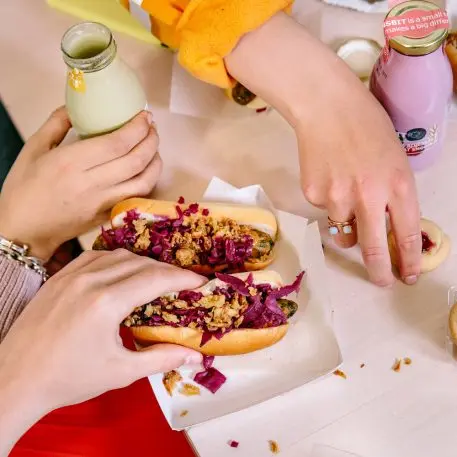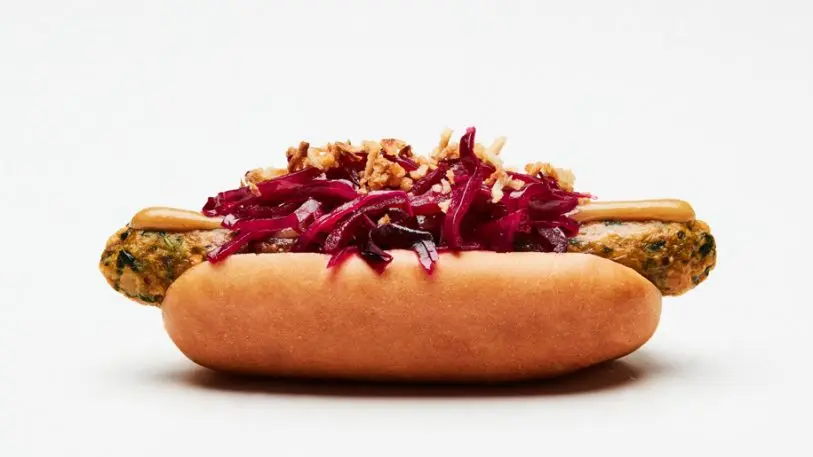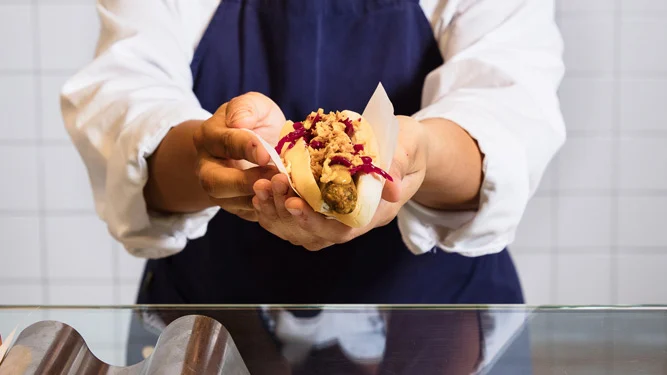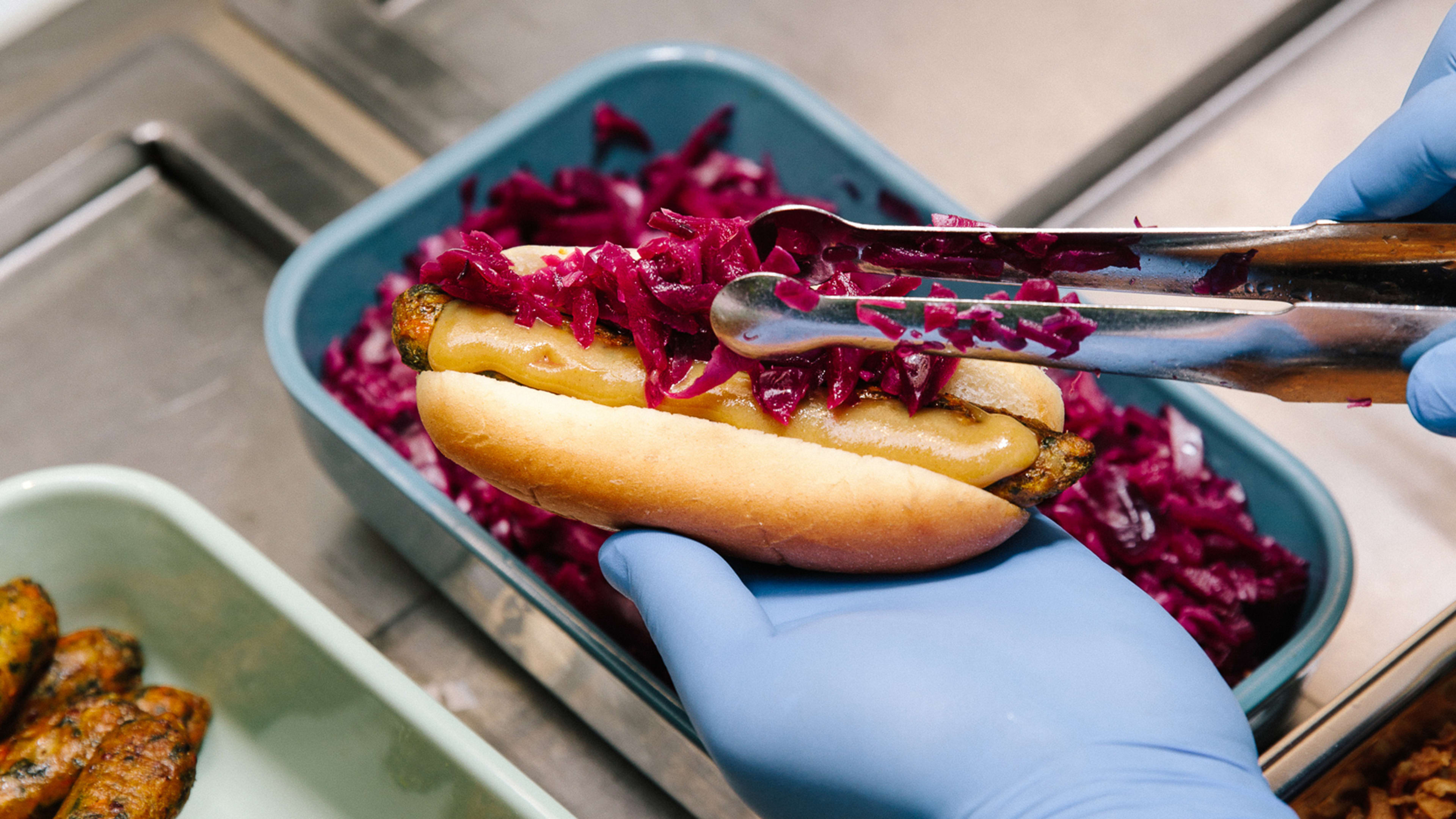At the food counter past the checkout lanes at Ikea stores, where the company sells giant frozen yogurt cones for a dollar and other snacks to keep guests satiated and ready to buy more sofas, it’s now possible to buy a hot dog for just 75 cents. And the hot dog has no meat in it at all.
Made from a blend of kale, red lentils, carrots, and ginger, and served on a soft bun slathered in sweet and spicy mustard, pickled red cabbage, and crispy onions, the vegan dog (the bun makes it just vegetarian) is designed in part to appeal to a growing number of customers who want to eat healthier and plant-based food. But it’s also part of Ikea’s much larger ambition to cut its carbon footprint.
“What we absolutely aim for is to encourage customers to choose the veggie dog over the meat dog–and we also see a reality that that really happens,” says Merlijn Crébolder, Ikea food manager in the U.S. “We see in our sales figures that we are meeting the needs of our customers that already made the choice of vegan options, but we also see that the classical meat eater is very willing to try this option, because it’s really a tasty dog.”

Meat is one of the world’s largest contributors to climate change; one recent study suggested that shifting to a vegan diet is likely the single largest way one person can reduce their own environmental impact. Another suggests that beef consumption will need to drop 90% to avoid the most dangerous climate change. For Ikea, food ingredients are a relatively small part of its overall carbon footprint–in 2016, it was just 2%. But because of the company’s size, shifts in its menus do matter. Ikea, according to its recent sustainability report, is one of the top 10 largest food companies in the world. In a year, it sells 100 million hot dogs.
The company is working to reduce its emissions in line with the Paris climate agreement, and by 2030, aims to be “climate positive,” meaning that it will reduce more emissions than its value chain creates. Ikea has spent the last few years investing in its own wind and solar plants. “We’re an independent renewable power company at the same time as a home furnishing business,” chief sustainability officer Steve Howard told Fast Company in 2015. By 2020, it will run on 100% renewable electricity. It’s beginning to shift to zero-emissions deliveries, experimenting with ways to help customers resell used products, and eliminating single-use plastic products. Food is one piece of the overall changes.

Ikea’s first foray into plant-based food was a veggie meatball designed to compete with its iconic Swedish meatballs. The veggie balls, first offered in 2015, now make up 15% of the company’s overall meatball sales. The veggie hot dog was first tested in a Swedish store earlier this year, then expanded to other stores in Europe this summer. In the first two months, the company sold 1 million veggie dogs. The product launched in American stores in late September; in the first two weeks, Crébolder says, one out every 10 customers to buy a hot dog in U.S. stores is choosing the vegan version.

The company experimented with various recipes and landed on a version that doesn’t look or taste like an imitation of a beef hot dog. “We made the choice to develop a really honest product,” she says. “Food should be what it is. You should be able to see as a customer what you are eating, and therefore we made the choice to really develop it from vegetables.” The crispy onions, added as a topping, give “a little bit of snap to the dog” that would normally come from the texture of a sausage casing.
Unlike WeWork, which recently made the decision to stop buying meat, Ikea has no current plans to eliminate meat from its menu. But, like many other companies–from Google, which has tweaked its cafeteria menus to encourage people to eat less meat, to fast food chains like Sonic, which now sells a burger made partly from mushrooms–Ikea plans to continue adding more plant-based options to its cafeterias and the “bistros” near its checkout aisles. All of the food will be cheap. “Ikea decided to offer the healthy food really for a good price” says Crébolder. Where else is it possible to buy a vegetarian lunch for 75 cents?
“I think we see in the market that customers are asking more for healthy and sustainable options,” she says. “You see that’s really a growing trend, and Ikea wants to take a very serious position in that area.”
Recognize your brand’s excellence by applying to this year’s Brands That Matter Awards before the early-rate deadline, May 3.
